[Originally published at Film Inquiry] Ben Young has been acting in film and television for over two decades, though it is his filmmaking that has garnered recent attention from an international audience. The West Australian director first caught the eye of filmgoers and critics around the world with his feature screenwriting and directorial debut Hounds of Love, which premiered at Venice Film Festival in 2016 to mass walkouts due to its subject matter, despite it receiving rave reviews from critics.
Hounds of Love depicts a young woman who is kidnapped by a maniacal serial killer couple in 1980s Perth, Australia, the most isolated city in the world. Though the film hardly shows any explicit content, Young made sure that every horrific act committed in Hounds of Love was just offscreen, leaving the events taking place onscreen open to the viewer’s imagination based on unsettling sound effects and screams. Young was lauded for his story, taught direction, and character development, prompting a myriad of Hollywood executives to come knocking on his door, eager to work with the rising talent. Young would choose Extinction as his next project.
Co-written by Spenser Cohen and Brad Kane, Extinction is about a family man, Peter (Michael Peña), who has recurring dreams of losing his family to a mysterious force in the sky. What is originally written off as stress and mental illness, violently turns into reality as the planet is invaded by immensely powerful aliens hellbent on destroying every human being on it.
Eventually, Peter realizes a hidden strength inside of him to protect his wife, Alice (Lizzy Caplan), and his two daughters. Though it isn’t nearly as well-crafted as Hounds of Love, Young manages to carry over some of the suspense of his feature film debut, and his aptitude for effectively executing twists along with it, while adding visual depth to an interesting, albeit sometimes generic script.
A Dystopian Vision
The world which the characters inhabit in Extinction is aesthetically fascinating. Youngdepicts an almost post-capitalist world that doesn’t seem to be bothered by classism. The corporations are worker-run, the living spaces are luxurious and affordable to blue and white collar workers alike, and there seems to be a collective awareness of the environment.
Vegetation is plentiful in urban areas, with “living rooftops,” or roofs that are covered in vegetation that absorb rainwater, provide building insulation, recreate habitats for wildlife that has been pushed out by industrialization, decreasing stress of the workers or residents who inhabit said buildings, and help lower urban air temperatures and combat the heat island effect (when an urban metropolitan area is significantly hotter than its surrounding suburbs as a result of human activity). Viewers can partially thank Alan Gilmore‘s production for the idyllic set pieces.

Though this world may sound like a utopia, of sorts, it is far from it. Sure, now that the world is veering away from being profit-driven, corporations and governments can truly focus on making the world a better place without being limited by the obligation of making somebody else money, for the most part; Alice works for the city, reducing pollution and sewage runoff and increasing overall livability and quality of life for its citizens.
However, there is something off about the people in the urban area in which Peter and Alice live; everyone appears to be aloof, entranced, and transfixed on where they need to be going, what they need to do, and the routines that they must complete. There is hardly any warm interaction among strangers in the world of Extinction. It truly gives one the sense that these people have been subconsciously brainwashed.
“Bodies Upon The Gears”
Indeed, when asked by a neighbor how her “job” is going, one of Peter and Alice’s daughters, who likes to operate the elevator in their apartment building, responds by saying, “Just a cog in the machine, sir. I complained to corporate, but who’d listen.” Of course, this is not only a playful nod to the self-importance and over-emphasis of the individual that the lingering effects of this capitalistic society still feels, stemming from the belief that one’s importance is determined from an outside source and not within, but it is also a reference to Mario Savio’s famous “Operation of the Machine” speech. This speech contains themes abundantly relevant in Extinction.
In his speech, Savio proclaims: “There is a time when the operation of the machine becomes so odious, makes you so sick at heart, that you can’t take part. You can’t even passively take part! And you’ve got to put your bodies upon the gears and upon the wheels, upon the levers, upon all the apparatus, and you’ve got to make it stop! And you’ve got to indicate to the people who run it, to the people who own it — that unless you’re free, the machine will be prevented from working at all!”

This originates from the socialist ideal that nobody is truly free as long as they are working for a corporation, entity, or person whose first interest is to make money, not to accommodate their workers or make a meaningful change in the world. Many people believe that society is controlled by man-made industrial, social, and political systems. In this case, Peter’s daughter is referring to the industrial system that begets technological determinism.
This is an extremely important theme in Extinction. As anarcho-syndicalist and libertarian socialist philosopher Noam Chomsky famously put it, economic, political, and ideological systems under the modern era of state capitalism have been taken over by large institutions of private tyranny, starkly contrasting “democratic” control, following the structural conditions of dictatorial power, referencing economist Robert Brady.
But if the “corporations” such as the one Peter works for are all worker-run, now, who exactly was in control, enacting the polices, before? When did this “peaceful” transition of power occur? That is what amplifies the mystery throughout Extinction.
Cohen & Kane Have The Right Idea(s)
Though there are undoubtedly intelligent ideas in Cohen and Kane‘s script, as aforementioned, they aren’t fully fleshed out enough. One has to really dig deep to understand the allegorical script; for the sake of keeping this review spoiler free, there won’t be any mention of what exactly the “cog in the machine” allegory is. Perhaps more visible is the theme of technology reaching a point of growth that humankind can no longer keep up with.
Stephen Hawking famously said that playing “god” and creating artificial intelligence(AI) will be our downfall. Author, computer scientist, inventor and futurist Ray Kurzweil went so far as to explain that a singularity is inevitable in his book “The Singularity Is Near: When Humans Transcend Biology.” Kurzweil essentially explains that technology will reach an exponential growth point, specifically AI, to the point where they can’t relate to humans anymore because of their superior intelligence and power, reaching a “singularity,” upon which humans and technology will merge. One could say that Extinction takes place in Kurzweil’s hypothetical world, somewhere on the timeline in relation to said singularity.

This is nothing new, however, and themes of technology backfiring on human beings have been present in film for decades through movies such as The Stepford Wives, Blade Runner, Terminator, and I, Robot. Perhaps the most relatable themes in Extinction are those of preserving one’s individual autonomy and freedom and choosing compassion over hatred. Young makes the script more palatable through his unique vision, captured on location in Serbia. He understands each parallel, theme, and intricate interpersonal relationship, something he’s proven as strength in his brief filmmaking career.
Extinction: Solid But Overlong
Even at 95-minutes, Extinction seems drawn-out. Young lingers a tad too much in the setting he has created, regardless of how beautiful it is. However, the slow pace makes the twists towards the end of the film considerably much more effective. Furthermore, Peña gives one of his finest performances, expertly selling the first big reveal.
Extinction is a Frankenstein’s monster that mostly works; it is Planet of the Apes meets I, Robot, with a touch of The World’s End without the comedy. Strong acting, wonderful direction, and a mostly alluring script overcome a somewhat commonplace story (in this day and age) with familiar themes in Extinction.
Did you see Young’s first feature, Hounds of Love? If so, how do you feel it compares to Extinction?
Netflix released Extinction on VOD in the U.S. and select countries on July 27, 2018. For more information on its release, click here.
Opinions expressed in our articles are those of the authors and not of the Film Inquiry magazine.








Leave a Reply
Your email is safe with us.